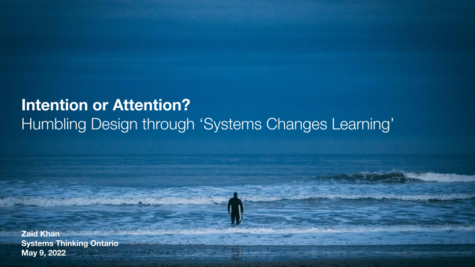System thinking, starting from graduate studies, can be a continuing (if not lifelong) journey. In parallel to a professional career in strategic communications, Zaid Khan has the distinction having studyied systemic design in the OCADU SFI program (2016-2020), under the supervision of Peter Jones. He became a cofounder of the Systems Changes Learning Circle in 2019, under a premise that our collective journey might take up to 10 years.
For the May 2022 session of Systems Thinking Ontario, Zaid reflected on the overlay of the rhythmic shifts primacy from collaborating in the Circle, following his formal educational activities.
After reviewing the trajectory of his thinking, Zaid invited open conversation.
This video available on Youtube has also been archived on the Internet Archive .
| Video | H.264 MP4 |
| May 9 (1h42m) |
[20220509_ST-ON IntentionAttentionDesignSystemsChangesLearning Khan.m4v] (FHD 815kbps 718MB) [on the Internet Archive] |
Audio downloadable onto mobile devices was transcoded from the video into MP3.
| Audio | |
| May 9 (1h42m) |
[20220509_ST-ON IntentionAttentionDesignSystemsChangesLearning Khan.mp3] (94.6MB) |
With some core ideas now having coalesced amongst Systems Changes Learning Circle cofounders, we welcome the systemic design community to explore new directions in mutual development.
The original description for the Systems Thinking Ontario session follows.
Systems Changes Learning (SCL) is a body of work that offers an updated way of thinking about and responding to change. The three premises of SCL dramatically reposition how we look and understand changes: as rhythms over time that might shift, in accord with the natures of the systems involved.
What could we learn from mapping the SCL premises to designing? This presentation will explore the potential influence that Systems Changes Learning could have on designing and designers, in philosophies, in methods, and in practices.
As a core member of the SCL Circle, Zaid will extend the framing of “humility” – from his Major Research Project “Responding to Complexity with Humility” (2020) – as a lens through which to examine and explore new modes of designing.
An overarching theme that Zaid examines critically is designing with a bias-towards-(intended)-action, as compared to SCL’s bias-towards-attention. Rather than presuming “interventions” pursuing an idealized end, Zaid wonders what designing would be like if attention was drawn to the nature of rhythmic shifts over time. Could we recontextualize the role and value of designers with our communities by “humbling designing”, or “designing with humility”? Taken even further, could this recasting of designing offer opportunities to reconnect the humble features of mainstream philosophies, or perhaps spiritual traditions with designing?
In parallel with the SCL pursuit of critically rethinking systems thinking, is there an opportunity to rethink designing?
Suggested pre-reading:
- David Ing, “Systems Thinking through Changes”, Canadian Digital Service , in collaboration with Code for Canada, March 4, 2022 at https://coevolving.com/commons/20220304-systems-thinking-through-changes
- Zaid Khan, “Strategic Communications”, Systems Thinking Ontario, September 14, 2020 at https://wiki.st-on.org/2020-09-14
- Zaid Khan, “Responding to Complexity with Humility: A Systems-oriented Approach to Strategic Communication” (Major Research Project), OCAD University, September 2020 at http://openresearch.ocadu.ca/id/eprint/3115/ .
- Peter Jones and Ryan Murphy, “Redesigning Our Theories of Theories of Change”, Systems Thinking Ontario, November 9, 2020 at https://wiki.st-on.org/2020-11-09 .



